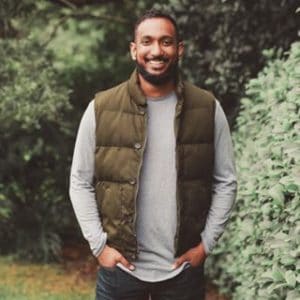I’m a Black pastor leading a majority white church. This is not common. Trust me, I know. I’ve been looking for people in my situation now for years and the list is very small.
People in my congregation are often surprised to hear about my negative experiences with authorities. I’ve been followed in certain stores, been the target of racial slurs, and more. Many of my majority culture friends struggle to understand what this feels like — not for lack of care, just lack of experience.
Friends often ask me, “How can I show I care for people of other races, when I have nothing from my own experience to draw from?”
That’s a great question — one I’m convinced many people ask and do not find a satisfying answer to.
For some of us, the context of the question is the pain of our minority brothers and sisters. For others, it’s trying to engage in conversations about the #MeToo movement. Maybe it’s refugees and immigrants or the LGBTQIA dialogues happening in our neighborhoods and on our university campuses and social media feeds.
But relating to people that are different than us can be incredibly challenging. If we’re honest, it sometimes feels impossible. It’s like we’re in a game of relational double Dutch. We want to engage but we do not know when or how to jump in.
So how do we engage with people and their stories when we do not understand — or when we just disagree?
Thankfully, we find the answer to this question in chapter four of John’s Gospel. Jesus’ best friend, John, records Jesus meeting with a Samaritan woman, known for immorality, at a place called Jacob’s Well.
And in this simple story Jesus demonstrates exactly what we should do if we want to understand others well. It involves three choices we all have to make.
- Choose intentionality.
- Lean into vulnerability.
- Persevere with asking questions.
1. Choose intentionality — in who you focus on
John tells us that Jesus “had to go through Samaria.” Jesus did not travel through Samaria because there was no other route to his destination. He intentionally engaged with a group of people hated by his Jewish community.
So if we want to relate to and understand those different than us, we must choose to go where they are. The question every Jesus-follower should ask is this:
“Am I choosing to live a life where I can build meaningful relationships with people that are different than me?”
Here’s an easy way to determine if you’re living this kind of life.
Look at the last ten text message threads on your phone and ask these questions:
- Do the people look like me? (race, style, language)
- Do they believe like me? (religion, values)
- Do they love like me? (gay, straight, queer)
When the answer to these questions is overwhelmingly “yes” it may suggest we live in an echo chamber. We’re only hearing voices similar to our own.
To grow in empathy we need to choose to engage in new friendships with different kinds of people. At the end of the day, the further away we are from people, the less perspective we have on their reality.
Proximity enables us to connect with and honor an individual’s story.
2. Lean into vulnerability
The way we experience diverse friendships is by choosing to place ourselves in a position of need. What do I mean?
Jesus did not need the Samaritan woman to give him water. He’s Jesus… he walks on the stuff. Even though Jesus did not need her help, he chose to place himself in a position of need for the sake of developing a relationship.
When people know we need and value them, they are more likely to be open with us about their stories.
I could have a Christian barber cut my hair. Instead, I place myself in a position of need by going to my Muslim barber. The result is that we often have great spiritual conversations.
You can choose a church that matches your cultural makeup. Or you can place yourself in a position of need by attending a church with ethnically diverse leadership.
Do you position yourself as the hero in your interactions with people that are different from you? Do you tend to be the one presenting the answers and offering all the resources? Or do you see yourself as the one in need?
This change in perspective makes all the difference.
Brené Brown puts it best: “Staying vulnerable is a risk we have to take if we want to experience connection.”
Are you willing to take the risk?
3. Persevere in asking questions
A question can spark a movement.
“Will you get me a drink of water?”
Jesus’ seemingly simple question started a conversation that changed the eternity of this Samaritan woman — and her village.
Imagine if Jesus had never asked the question. This woman would have gone to the well, drawn her water and walked home. Likely she would have soon forgotten the awkward Jewish man sitting silently at the well in the midday sun.
My friend Demarick is excellent at asking people questions. I’ve sat with him at lunch numerous times, watching him create a space for our waiter to open up about his life. He’ll ask a simple question like, “What’s your dream job?”
I remember a time he asked a young woman this question at a local burger joint and she burst into tears. She described pursuing her career until her father fell sick and she had to move home to care for him. She told us how lonely and hopeless she felt.
I watched Demarick speak words of encouragement to her in the middle of the restaurant. She went and told her co-workers who then came looking for encouragement too.
The reality is that people are looking for someone to care about them.
Much like that waitress, after the Samaritan woman experienced Jesus’ love, she brought her community to meet him. The Bible tells us that many people in that town believed in Jesus because of that woman’s testimony.
So if a question can spark a movement, here’s my question to you…
Who do you need to move toward?
Is it a person, or maybe a group of people?
Here are five simple steps you can take to see God work by focusing on someone else.
- Ask God to show you who he wants you to move toward.
- Enter their names in the “people” tab of MissionHub.
- Create a step of faith you want to take toward each person.
- Pray that God will help you take each step.
- Watch what he does.
You’ve got the tools you need, now let’s go for it!
Was this post helpful to you? You might enjoy the following:


